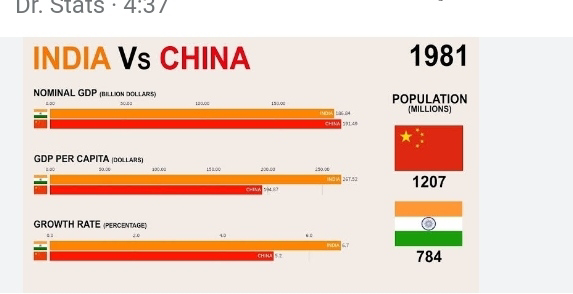The potential effect of Indian industrialization on the Chinese economy in the future is a complex topic, and it depends on various factors and assumptions. Here, I will outline some potential aspects to consider when discussing this subject.
1.Competition: As India continues to industrialize and develop its manufacturing capabilities, it may become a direct competitor to China in certain industries. India's vast population and potential consumer market make it an attractive destination for businesses, both domestic and foreign. If India's manufacturing sector becomes more competitive and offers similar products at lower costs, it could challenge China's dominance in certain markets. This could impact China's export-oriented economy and force it to adapt and find new markets or adjust its manufacturing strategies.
2.Global supply chains: Both China and India play significant roles in global supply chains, with China being a manufacturing hub and India emerging as a growing player. As India's industrialization progresses, it may attract foreign investment and become an alternative or complementary manufacturing base to China. This could result in a redistribution of supply chains, with some companies diversifying their manufacturing operations by shifting or expanding to India. Such shifts could impact China's position as the primary global manufacturing center, potentially affecting its economy and trade dynamics.
3.Trade relations: China and India are major trading partners, with significant bilateral trade flows. Any changes in India's industrialization could have an impact on this trade relationship. If India becomes more self-sufficient in certain sectors and reduces its imports from China, it may lead to a decline in bilateral trade. However, it is important to note that India's industrialization could also create new opportunities for cooperation and trade between the two countries, especially if they can develop complementary sectors or engage in joint ventures.
4.Technological advancements: Industrialization is closely tied to technological advancements and innovation. As India aims to boost its industrial sector, it will likely invest in research and development, technology transfer, and innovation. If India successfully develops advanced manufacturing capabilities and becomes a hub for emerging technologies, it may pose a competitive challenge to China's dominance in areas like electronics, information technology, and telecommunications. This could lead to increased rivalry but could also foster collaboration and knowledge-sharing between the two countries.
5.Economic interdependence: The global economy operates in a highly interconnected manner, and the economies of China and India are no exception. Any significant changes in one economy are likely to have ripple effects on the other. While there may be some competition and potential impacts on certain sectors, it is important to recognize that economic interdependence also creates opportunities for cooperation and mutually beneficial outcomes. Both China and India have diverse and expanding economies, and their growth and development can potentially complement each other in various areas, such as trade, investment, and technological collaboration.
It is worth noting that predicting the exact future impact of Indian industrialization on the Chinese economy is challenging and subject to various uncertainties and assumptions. Economic dynamics are influenced by a multitude of factors, including policy decisions, geopolitical developments, global economic trends, and technological advancements. Therefore, any analysis should be considered within this context and with the understanding that future outcomes may differ from current expectation.







0 Comments